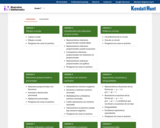
Per April
- Subject:
- Mathematics
- Material Type:
- Activity/Lab
- Assessment
- Full Course
- Homework/Assignment
- Textbook
- Author:
- Illustrative Mathematics and Kendall Hunt
- Date Added:
- 09/17/2020


Per April
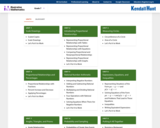
From April
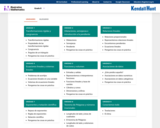
Per April
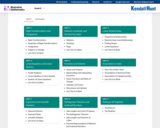
Per April

Want to learn about the Federal Reserve? Have no fear! In Plain English describes the structure and functions of the Federal Reserve System in an easy-to-understand interactive format.
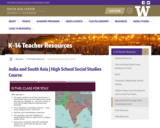
India and South Asia: From Area Studies to Ethnic Studies
Course design by Rachel Heilman, Issaquah High School.
Developed with the support of Sunila Kale (Associate Professor of International Studies) and the South Asia Center (Henry M. Jackson School of International Studies, University of Washington), with funding from the U.S. Department of Education National Resource Centers Program.
Dear Colleague,
I hope you are able to implement some version of this course at your institution! I have it aligned to Washington State Social Studies Standards, but it is right in line with Common Core-driven expectations and should fit well with any state’s standards. This course also very much supports the new Washington Ethnic Studies Framework.
––Rachel Heilman, March 2022
Course Description
How can understanding a particular region both shape and enhance our understanding of ourselves and the world around us? As we gain knowledge, how do we both recognize and cross the political boundaries we see on maps? In this one-semester course we will use an interdisciplinary approach to examine India and wider South Asia as we work to conceptualize the ways people, power, geography, and the past shape the region. For the purposes of this course South Asia will include Bangladesh, Bhutan, India, Maldives, Nepal, Pakistan, and Sri Lanka. In our role as global citizens we will also expand our inquiries to the web of connections between South Asia and our own individual and social identities.
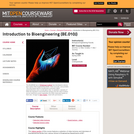
This course samples the wide variety of bioengineering options for students who plan to major in one of the undergraduate Engineering degree programs. The beginning lectures describe the science basis for bioengineering with particular emphasis on molecular cell biology and systems biology.
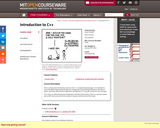
This is a fast-paced introductory course to the C++ programming language. It is intended for those with little programming background, though prior programming experience will make it easier, and those with previous experience will still learn C++-specific constructs and concepts.
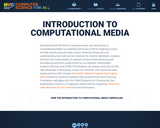
Developed by the NYCDOE CS education team, the Introduction to Computational Media is a yearlong (108 hours) creative computing course for high schools using the open source Javascript library p5.js. By understanding how code can be a medium for creative expression, students will learn the fundamentals of computer science while designing and prototyping interactive projects that run on a browser. Additionally, students will learn how HTML/CSS elements can interact with p5.js to fully take advantage of developing content for a browser. This course has been implemented in NYC schools via CS4All’s Software Engineering Program (SEP), revised by classroom teachers with guidance from the Processing Foundation, and aligns with the CS4All Blueprint for CS education that emphasizes a hands-on CS approach called creative computing. Watch this video and view this fact sheet for more information.
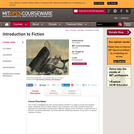
This course investigates the uses and boundaries of fiction in a range of novels and narrative styles--traditional and innovative, western and nonwestern--and raises questions about the pleasures and meanings of verbal texts in different cultures, times, and forms. Toward the end of the term, we will be particularly concerned with the relationship between art and war in a diverse selection of works.
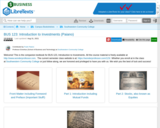
Investing is not as difficult as you think; we will show you how. (Speculating and trading are very, very difficult; we can't help you with those. Sorry.) After you have taken this course, you will have a strong foundation of the most important financial investments. We cover stocks, bonds, mutual funds, short-term investments (a.k.a. "cash"), hybrid instruments, and a few others. We want to emphasize that this is an introduction class. You do not need any prior investment experience. We start from the very beginning with the question, "What is an Investment?" Come join us! (http://www.wonderprofessor.com/123)
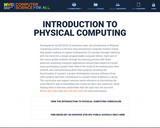
Developed by the NYCDOE CS education team, the Introduction to Physical Computing course is a 54-hour long introductory computer science course that guides students to explore fundamental CS concepts through tinkering with the micro:bit, a simple programmable computer device. Each unit of the course guides students through the learning process with three practices: analyzing computer applications around them based on a given issue; prototyping a project that reflects the result of the analysis plus their interest; and communicating about their projects, including the functionality of a project, a project development process, influence from other projects and their contribution to a project when working in a group. The curriculum and support sessions assist educators in discovering the most effective way of facilitating this course for their own classroom, while helping them to become comfortable with the main tool, the micro:bit.
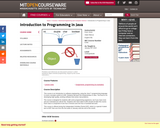
This course is an introduction to software engineering, using the Java™ programming language. It covers concepts useful to 6.005. Students will learn the fundamentals of Java. The focus is on developing high quality, working software that solves real problems.
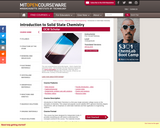
Introduction to Solid State Chemistry is a first-year single-semester college course on the principles of chemistry. This unique and popular course satisfies MIT's general chemistry degree requirement, with an emphasis on solid-state materials and their application to engineering systems.
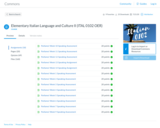
This OER is a second-semester online language and culture manual designed for students in higher education. It follows a 14- or 15-week semester. Registration to Canvas Commons is required but free. This OER features online grammar and vocabulary practice and interactive assessment of various kinds.
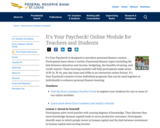
It's Your Paycheck! is designed to introduce personal finance content. Course participants learn about a variety of personal finance topics including the link between education and income, budgeting, the benefits of saving, and credit reports. These learning modules will help participants make sense of W-2s, W-4s, pay -day Loans and APRs in an interactive online format. It's Your Paycheck! consists of nine individual programs that can be used together or individually to enhance personal finance learning.
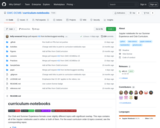
This curriculum was designed for high school students with no prior coding experience who are interested in learning Python programming for data science. However, this course material would be useful for anyone interested in teaching or learning basic programming for data analysis.
The curriculum features short lessons to deliver course material in “bite sized” chunks, followed by practices to solidify the learners' understanding. Pre-recorded videos of lessons enable effective virtual learning and flipped classroom approaches.
The learning objectives of this curriculum are:
1. Write code in Python with correct syntax and following best practices.
2. Implement fundamental programming concepts when presented with a programmatic problem set.
3. Apply data analysis to real world data to answer scientific questions.
4. Create informative summary statistics and data visualizations in Python.
5. These skills provide a solid foundation for basic data analysis in Python. Participation in our program exposes students to the many ways coding and data science can be impactful across many disciplines.
Our curriculum design consists of 27 lessons broken up into 5 modules that cover Jupyter notebook setup, Python coding fundamentals, use of essential data science packages including pandas and numpy, basic statistical analyses, and plotting using seaborn and matplotlib. Each lesson consists of a lesson notebook, used for teaching the concept via live coding, and a practice notebook containing similar exercises for the student to complete on their own following the lesson. Each lesson builds on those before it, beginning with relevant content reminders from the previous lessons and ending with a concise summary of the skills presented within.
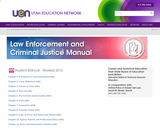
A student manual developed by the Utah State Board of Education, in cooperation with the Unified Police of Greater Salt Lake
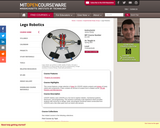
LEGO® robotics uses LEGO®s as a fun tool to explore robotics, mechanical systems, electronics, and programming. This seminar is primarily a lab experience which provides students with resources to design, build, and program functional robots constructed from LEGO®s and a few other parts such as motors and sensors.
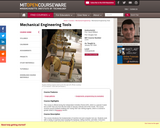
This course introduces the fundamentals of machine tool and computer tool use. Students work with a variety of machine tools including the bandsaw, milling machine, and lathe. Instruction given on MATLAB®, MAPLE®, XESS™, and CAD. Emphasis is on problem solving, not programming or algorithmic development.